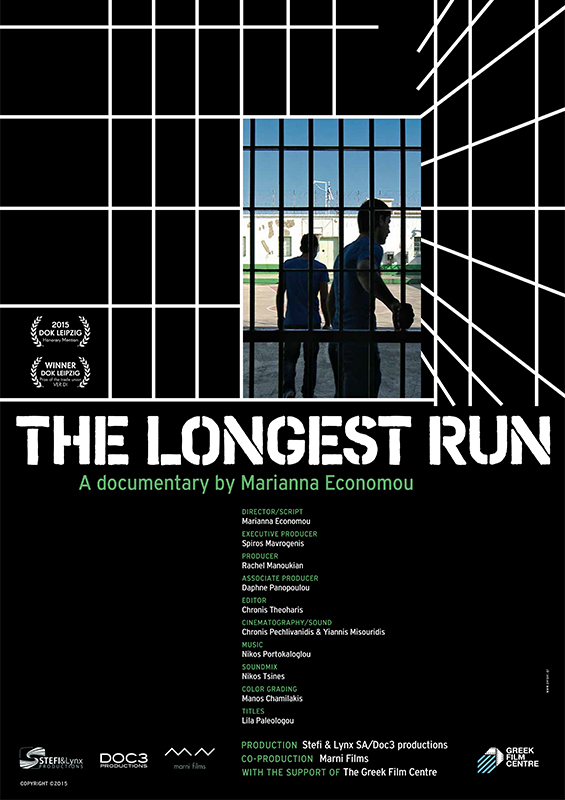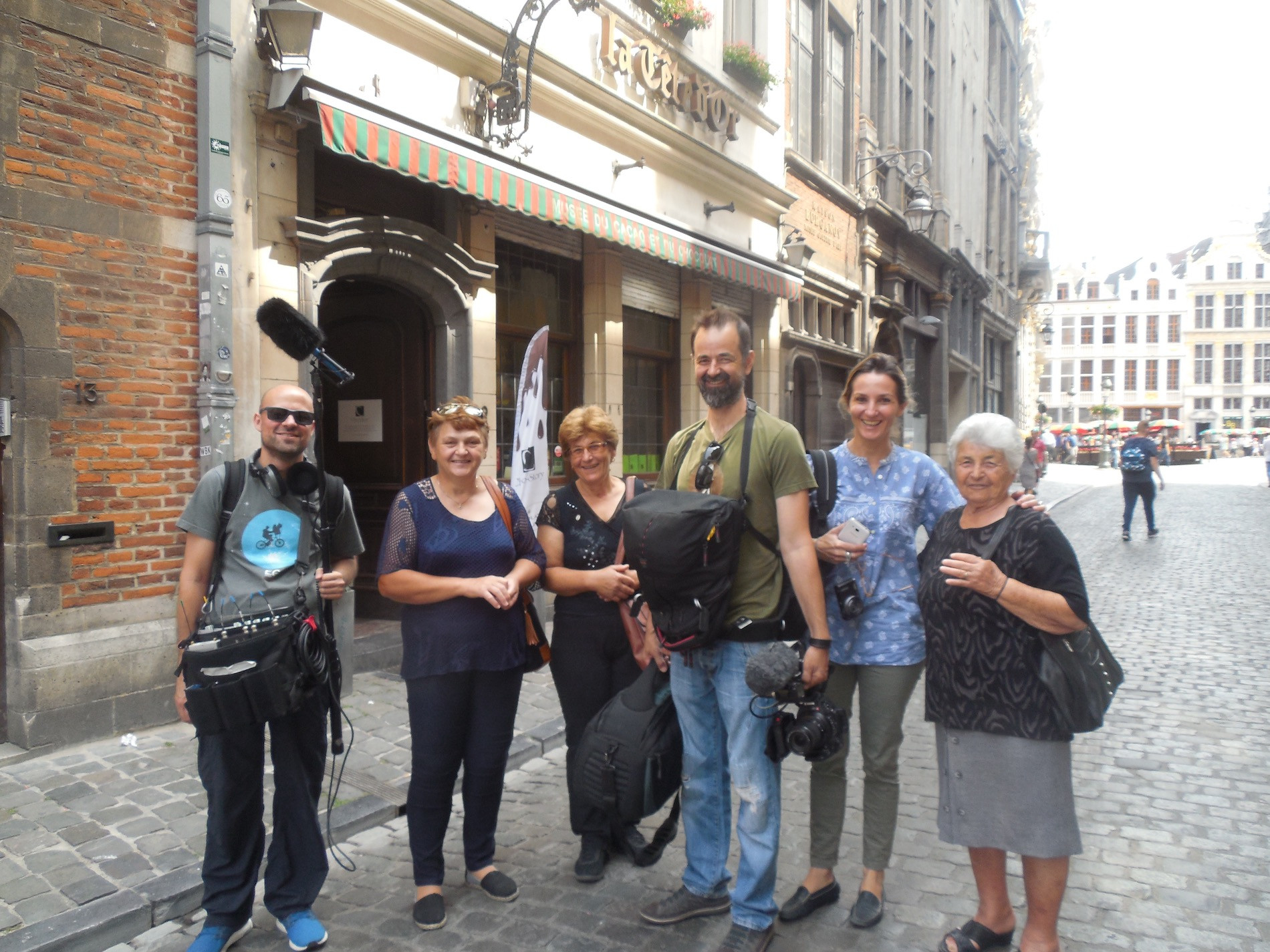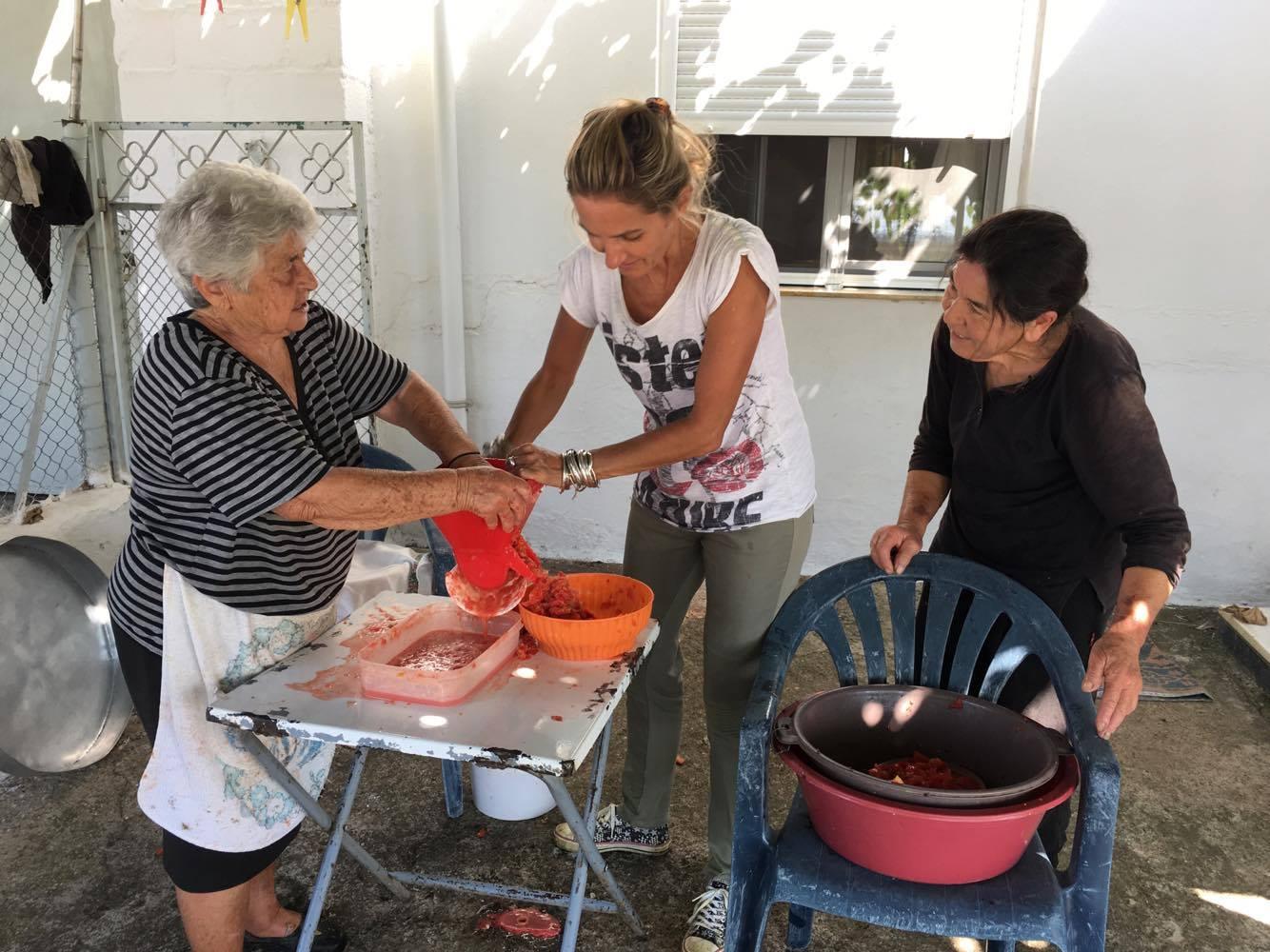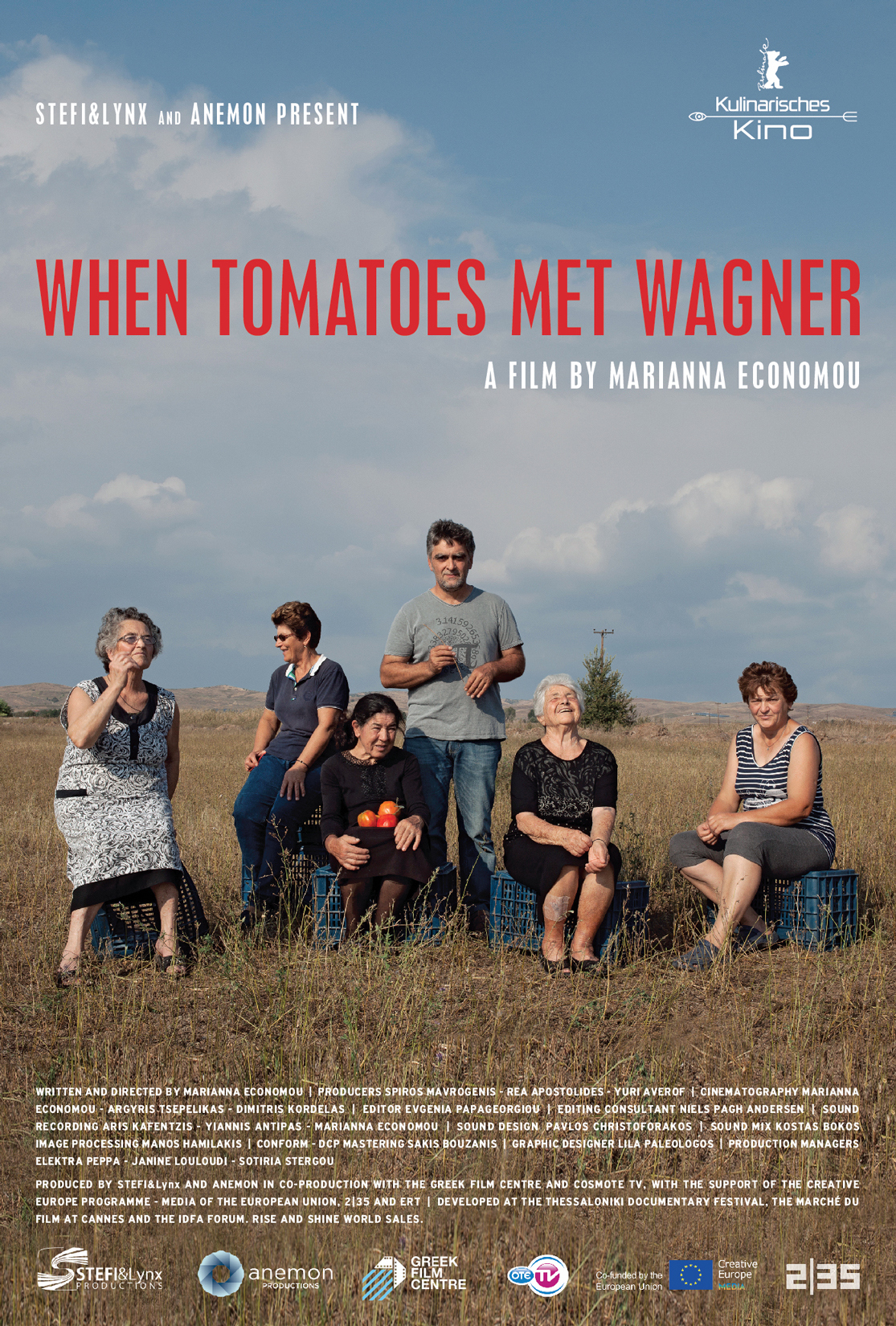

Marianna Economou - The Story of Greek Tomatoes
An interview with the Greek filmmaker Marianna Economou.
Geplaatst op 16 augustus 2020This interview with Marianna Economou, the filmmaker from sunny and warm Greece, will please the CineSud Magazine readers these summer month. She is going to tell us about her education at three different colleges, about accidentally meeting with a British producer, about the turning point in her life and, most interestingly, about her humorous and uplifting documentary When Tomatoes Met Wagner.
"My aim was to expose the threatened existence of small farming communities in a globalized economy of mass food production, and also to make the audience empathize with the protagonists' special attitude to life."
Background
The Greek filmmaker Marianna Economou's childhood dream was to become a shepherd. However, when Marianna was ten, her father acquainted her with a camera. He showed the future director how to take photographs with their old Rolleiflex. She remembers: "Suddenly a new amazing world opened up for me. Since then I have always carried a camera and documented everything happening around me. I realized early on that the camera was a great excuse to get close to people and situations."
When Marianna was a teenager, she came across the National Geographic magazine that could only be received by subscription in Greece. She was mesmerized by the images and articles concerning different cultures, societies and people. Therefore, the director made the decision to study Anthropology at the University College London (UCL), as there was no opportunity to take such a course at a Greek university. Marianna says: "As I became more and more interested in the discourse with regard to visual representations, I also decided to study Photojournalism at the London College of Communication and Video Production at the South Thames College in order to find a practical expression and application of all the things I had learnt in Anthropology."
All three disciplines at three different colleges were extremely interesting, very useful and complementary to one another in Marianna's point of view. She believes that they gave her very important skills and tools for further development. The director comments: "They opened my eyes to the world, satisfied my curiosity and widened my interests. They established a good basis in the field of social sciences and visual representation. It is difficult to tell which one was my favourite. Anthropology widened my horizons and offered me a method of analysis and understanding. Photojournalism taught me how to get closer to events and people and how to tell stories visually. Video production gave me some important technical skills and introduced me to the magic of editing." In general, Marianna spent nine very creative and efficient years in England studying and working as a photojournalist for British magazines. However, after that, she decided to move back to Greece for personal reasons.
Getting the chance to work with documentaries
Marianna used to work as a photojournalist but she always had the desire to be involved in filming as well. She just didn't know how to start. One event gave her that unique opportunity. Marianna says: "I was in Athens and one day my friend mentioned that a British producer was coming to Greece to scout for filmmakers for a European documentary series for the BBC and ARTE. I asked my friend if I could come to the first meeting just to sit quietly in a corner and listen to the presentation. I remember being so excited listening to the producer, talking about storytelling and how to be a one-person crew." The director also remembers that - probably out of politeness as she thinks - the producer asked her to show her portfolio which was mostly full of street photography and portraits. He then turned around and asked whether Marianna would like to try out filming. She couldn't believe it and of course, she agreed!
The producer handed Marianna a small digital camera, showed her some basic technical stuff about shooting and sound and she started to do her first documentary. She says: "I owe everything to this man who saw something in my photography and took the risk with me. Since then I haven't stopped making documentaries and my passion for this cinematic genre grows day by day. I love the shooting process and the magic of editing.”
Now Marianna is a member of the European Film Academy. In order to be a member, a filmmaker needs to have at least one film nominated for an award. It is a great honour for her to be a part of the film community and to have the chance to watch and vote for the best European film every year. Marianna says that being a member of the Academy gives you some extra recognition and perhaps benefits when applying for funds.

Best film
Answering the question which film of her productions she considers to be the best, Marianna draws an interesting parallel: "It is like asking me which child is my favourite. How can I answer? I usually spend a long time on each film, and each film reflects a particular period in my life. They are all my babies, I love them for different reasons. Through these films I immerse myself in different worlds, new relationships and life experiences, and that makes them a part of me."
Most often Marianna finds ideas for her films by chance. She may meet a person who evokes a special attraction, hear or read about a story or an idea that will just stay in her mind, or see something that may intrigue her and awaken her curiosity. The first attraction and interest is usually instinctive, a gut feeling which takes shape with time.
When Tomatoes Met Wagner
When Tomatoes Met Wagner is a humorous and uplifting story of two ingenuous Greek men, who try to tackle the world market with their organic tomato products. Everything started with the largest farming plain in central Greece which, at first sight, has nothing really special about it, yet something unexpected was taking place in a particular dying village of 30 elderly inhabitants. The inhabitants, living in the mountains and planting tomatoes, had a great plan: they wanted to expand and sell their products abroad. This drew the curiosity of the director and kept her interested in this story for many years.
Marianna did not have a clear idea or a set scenario from the beginning. The final film was the result of an organic process which was based on the particular relationships that she built with the main characters. The story could have been told in many different ways and this was the most challenging for Marianna. She remembers: "At first I spent a few days in the village, participated in the daily chores of the women-workers on the farm and listened to their stories. I knew it was essential to build a relationship of trust and to create a sense of familiarity. I always carried a small camera. I felt it was important for them to accept me in my particular role. Very soon the personal relationships became more important than the presence of the camera. Then the real filming started."
There was something very original and at times totally surreal about these people. In spite of the fact that they were struggling for their daily survival, most of them had never left their village. The most interesting element for the director was that they used stories and myths in order to make sense of themselves and to acquire the courage to try out new things. It was their humour and their ability to imagine life beyond their mountain that made them dare and eventually achieve extraordinary things. For Marianna it was a lesson of courage, open-mindedness and a true sense of cooperation.
The trip to Brussels where the tomatoes were going to be sold was amazing. It was the first time the women had left their village or had flown on a plane and yet they took everything in their stride. They were very excited, but what surprised the director was that they never stopped worrying about their crops and fields back home.
The witty title, When Tomatoes Meet Wagner, was inspired by a scene in the film. One day the protagonist's cousin, who is a traditional farmer, decided to play Wagner to the tomatoes in the field in order to increase the yield and the taste. It was totally spontaneous, absurd and surreal. Marianna's crew decided to choose this title because it reflected the originality and the paradoxes involved in this story.
The story has a political and a human dimension. The director says: "My aim was to expose the threatened existence of small farming communities in a globalized economy of mass food production, and also to make the audience empathize with the protagonists' special attitude to life. I believe this story provides a remarkable example of how important it is to be able to reinvent oneself in difficult times, as well as what a crucial role human relationships, poetry and humour play in our lives."


Festival experience
Personally, Marianna prefers small film festivals. She thinks that they are generally friendlier and that it is easier to meet people there. The director comments: "Big festivals like the Berlinale, or the International Documentary Film Festival Amsterdam offer a big selection of films but I feel it is the market aspect that tends to take over and to attract so many people. Festivals are very important for the exposure and distribution of the films. They are the places where the creative team meets the audience and gets an immediate feedback. I enjoy the Q&A's because they provide a face to face contact with the audience." What is more, Marianna says that festivals are also useful for meeting other colleagues, exchanging ideas and building relationships and cooperations.
Unfortunately, due to the quarantine many festivals had to be canceled or postponed. Marianna was looking forward to going to a few more. She thinks it is admirable though how many festivals took place online and that they actually worked very well. These past weeks, the director has seen many interesting films and masterclasses that festivals have put online. However, she hopes that this does not become a habit. Marianna strongly believes that nothing can replace human contact.
The director says: "The corona virus stopped all activity in Greece. I was ready to start the production of a TV documentary series and a new project but they were both postponed. I am back to work now, but I think it will take some time to really return to a form of normality. Documentary involves natural setups and non-actors, there are still some difficulties with shooting people and filming in houses and enclosed spaces.”
By now, Marianna Economou is already in the developing stage of a new project. This time an ancient place full of contradictions and extremes has touched her heart. Moreover, because of the coronavirus-experience, another very interesting and moving story about memory and death was brought to the director's attention that is now waiting to be told.

(c) All visual material is used with the filmmaker's permission.